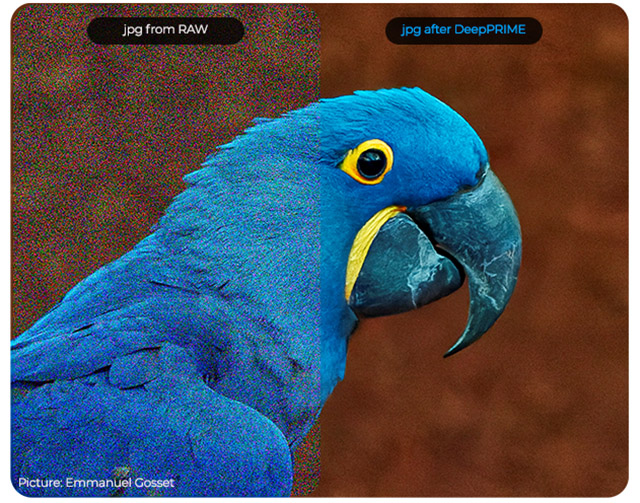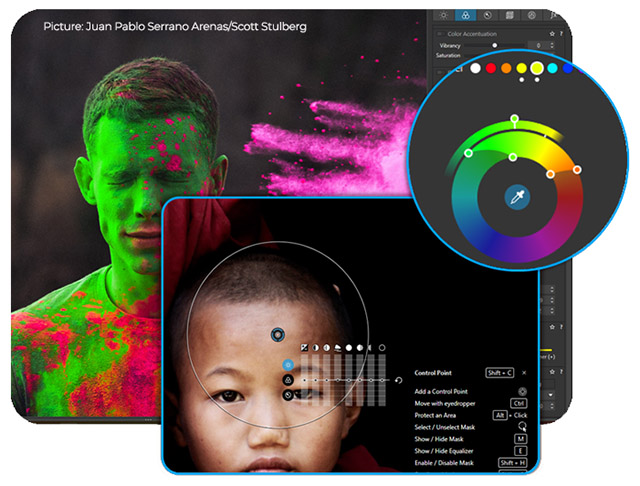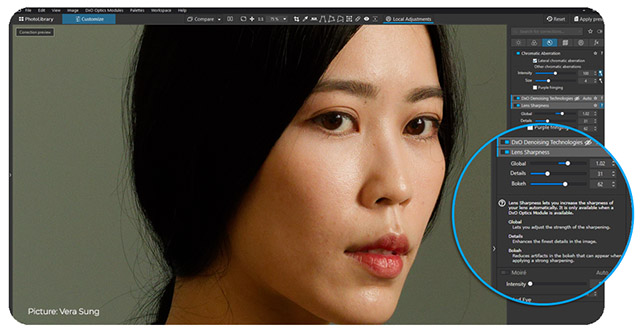DxO announces PhotoLab 6: All-in-one raw editor delivers improved image quality, editing tools and photo management
posted Wednesday, October 5, 2022 at 8:01 AM EST

DxO has announced DxO PhotoLab 6, the next version of the company's all-in-one raw photo editing software. The software is underpinned by a brand-new version of DxO's DeepPRIME technology, DeepPRIME XD, where XD stands for "eXtreme Detail."
DeepPRIME XD, like prior iterations of DeepPRIME, uses artificial intelligence to perform demosaicing and denoising simultaneously on your raw image files. XD uses a neural network trained using billions of images to deliver better noise reduction and more vibrant colors. DxO says that DeepPRIME XD can provide improvements of more than 2.5 stops. This means that an image shot at ISO 4000 will look more like an image shot at ISO 500 using the same camera in terms of noise, color and sharpness. DeepPRIME XD can even help expand the visible dynamic range of images, especially those shot at high ISO or in low-light settings.
"We were thrilled by the response to DeepPRIME in DxO PhotoLab 5, but we knew we could do more," said DxO's VP of Marketing and Product Strategy, Jean-Marc Alexia. "The new DeepPRIME XD has been a year in development and the AI has literally been teaching itself how to do its job better. The results speak for themselves."

In addition to DeepPRIME XD, DxO PhotoLab 6 includes re-engineered color processing algorithms to deliver better color management. Part of this is a new, extended working color space called DxO Wide Gamut. It's much wider than sRGB and Adobe RGB (1998). It's similar to ProPhoto RGB, but DxO states that DxO Wide Gamut offers a more accurate representation of the visible spectrum. DxO Wide Gamut displays 100% of the colors you can see in nature, per DxO. PhotoLab 6 also includes a Soft Proofing mode to ensure color accuracy throughout your workflow.
DxO PhotoLab 6 includes a new ReTouch tool that brings some of the functionality you typically need to use Adobe Photoshop for into DxO's all-in-one raw editor. There are tools for mirroring, rotating, scaling and using brushes to fine-tune the shape of an area. DxO writes, "The new tool ensures fewer trips outside of DxO PhotoLab for complex cloning and healing tasks, and speeds up workflow while ensuring that editing never moves away from the original raw file and therefore remains non-destructive."
While there aren't any changes to U Point, it's worth noting, as it's one of PhotoLab's best features. The U Point technology allows users to perform in-depth, sophisticated local adjustments without creating customized masks or brushes. With U Point technology, you click on an area you want to edit. Then the app automatically selects pixels for adjustments such as exposure, contrast, vibrancy, saturation, color temperature, and much more.

The app includes a full library, and DxO PhotoLab 6 improves the PhotoLibrary. The software includes Exif and IPTC tags, nesting for Projects and adds color labels to help you organize your files. The color labels are stored in accompanying .xmp files, which are recognized by other software in your workflow. PhotoLab 6, like prior versions, doesn't use catalogs or have an import process. You point the software toward your images, wherever they're located.
DxO PhotoLab 6 also includes an improved crop tool with horizon control. The app is also more stable than the previous release. Further, there's now a fully native version for Mac users with Apple Silicon computers.
DxO has also announced an update to its cutting-edge Optics Module. The latest version includes new support for nine lenses, including the Canon RF 24mm F1.8 Macro IS STM, Nikkor Z 28-75mm F2.8, HD Pentax-D FA 21mm F2.4 ED Limited DC WR, HD Pentax-FA 31mm F1.8 Limited, HD Pentax-FA 43mm F1.9 Limited, HD Pentax-FA 77mm F1.8 Limited, Sigma 18-50mm F2.8 DC DN C, Sigma 35mm F2 DG DN C and the Sony E 11mm F1.8. More than 77,000 camera and lens combinations are supported across DxO PhotoLab, PureRAW, ViewPoint, FilmPack and Nik Collection.

DxO's optical corrections are second to none because they are precisely created in laboratory settings and are not reliant upon data from individual manufacturers. The tailor-made adjustments assess 100% of the pixel area and correct for optical distortion, vignetting and chromatic aberrations (longitudinal and lateral). There's also an exclusive lens sharpness algorithm to provide sharpening catered to a lens's specific characteristics.
DxO PhotoLab 6 comes in two versions, Essential and Elite. Some key differences between the Essential and Elite versions are that Elite includes DeepPRIME XD and DeepPRIME. The Elite edition also includes support for X-Trans image sensors. The Essential Edition is $139 for new users and $75 for existing users of PhotoLab 4 or 5. DxO PhotoLab 6 Elite Edition is $219 for new users, and an upgrade is available for $99. A free, fully-featured 30-day trial is also available. For more information, visit DxO.
Index image by Kelvin Chan